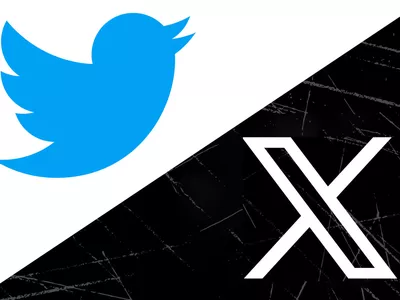
Tips and Tricks for Apple ID Locked Issue On Apple iPhone 13

Tips and Tricks for Apple ID Locked Issue On Apple iPhone 13
An Apple ID is a crucial gateway to Apple’s ecosystem. An Apple ID grants access to iCloud, the App Store, and more. However, the frustration of dealing with a disabled Apple ID can be overwhelming. The article below provides essential tips and tricks to unlock Apple ID successfully.
The page discusses common reasons for lockouts, steps to regain access, and proactive measures to prevent future issues. Don’t let your locked Apple ID stress you out. Follow the expert advice by exploring the article to resolve it. Enjoy uninterrupted access to your Apple services.
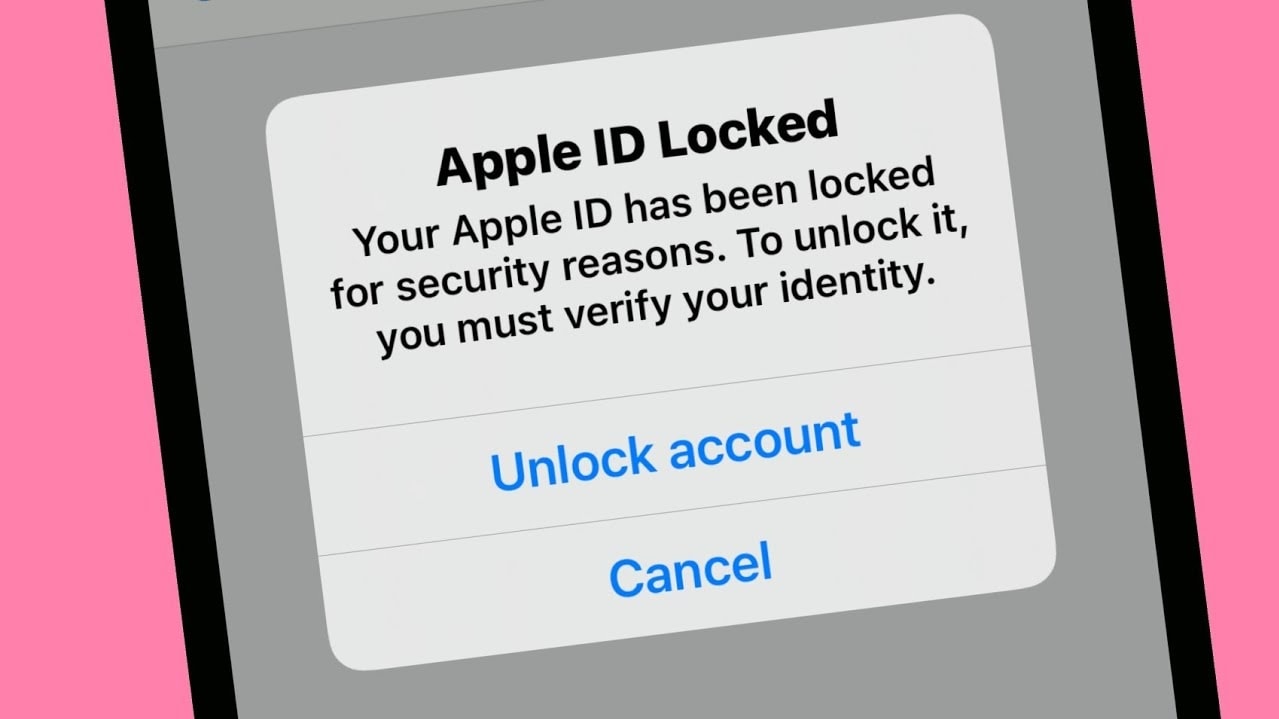
Part I. Common Reasons Why Apple ID Gets Disabled
Apple ID lockouts can be a frustrating experience. Understanding the reasons behind them can help you easily prevent and resolve these issues. Here are the most common causes of Apple ID disablement:
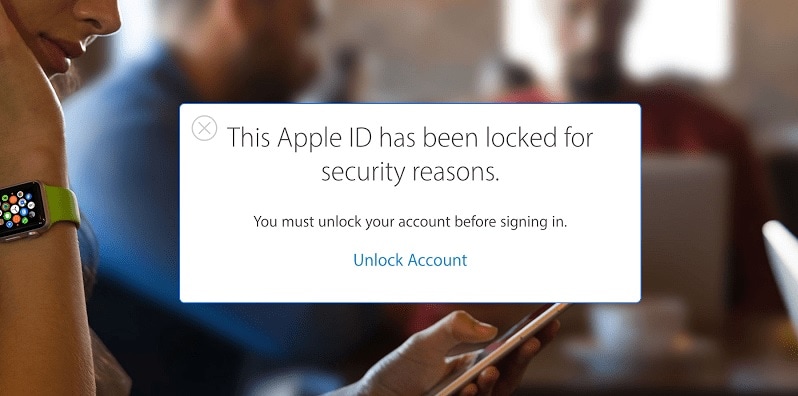
- Security Concerns: Apple takes security seriously. If Apple suspects unauthorized access to your account, they may deactivate it to protect your data.
- **Failed Login Attempts.**Repeated unsuccessful login attempts can trigger Apple’s security measures, whether by you or a potential attacker. It can result in your ID being disabled.
- **Payment Issues.**If there are problems with your payment method, Apple may disable your ID to prevent unpaid charges.
- **Violation of Apple’s Terms of Service.**Any breach of Apple’s terms and conditions can lead to your Apple ID being disabled. These include using unauthorized software or services.
- **Age Restriction Violations.**Apple may disable the account to comply with legal requirements. It triggers if a user under the age of 13 tries to create an Apple ID or access certain features.
- **Unusual Account Activity.**Suspicious activity, such as a sudden change in location, can result in an Apple ID lockout. It can also happen during unusual sale patterns or many login attempts from different locations.
Apple’s reputation for strong security measures is a significant reason for its popularity. The company uses robust encryption, 2-FA, and software updates to protect user data. Users trust Apple to safeguard their personal information. So, it’s essential to maintain a secure Apple ID to enjoy their services and have peace of mind.
Part II. 5 Basic Ways of Unlocking Your Apple ID
Unlocking your Apple ID is crucial to regain access to your valuable data. Here are five basic ways to unlock your Apple ID:
Contacting Apple’s Official Support
Contacting Apple’s official support is often the most reliable solution. Visit the Apple Support website or use the Apple Support app on your device. Apple’s support team can guide you through unlocking your Apple ID, ensuring it’s done right.
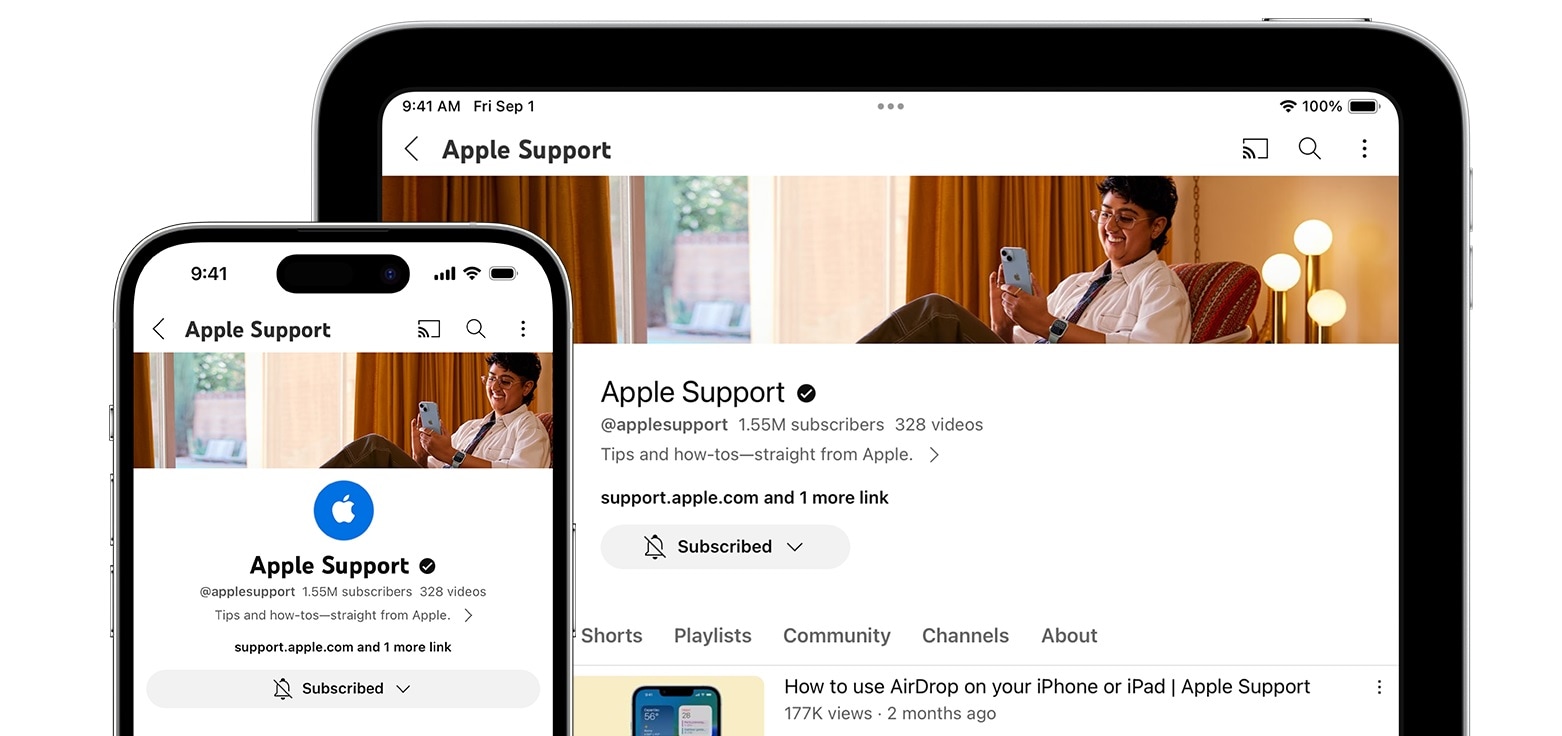
Account Recovery (iForgot)
Visit iforgot.apple.com, where you can initiate the account recovery process. Once on the website, you’ll have to enter your Apple ID. Next, you can choose how to reset your password or verify your identity through email. You can also answer security questions you’ve set up or verify through a trusted device.
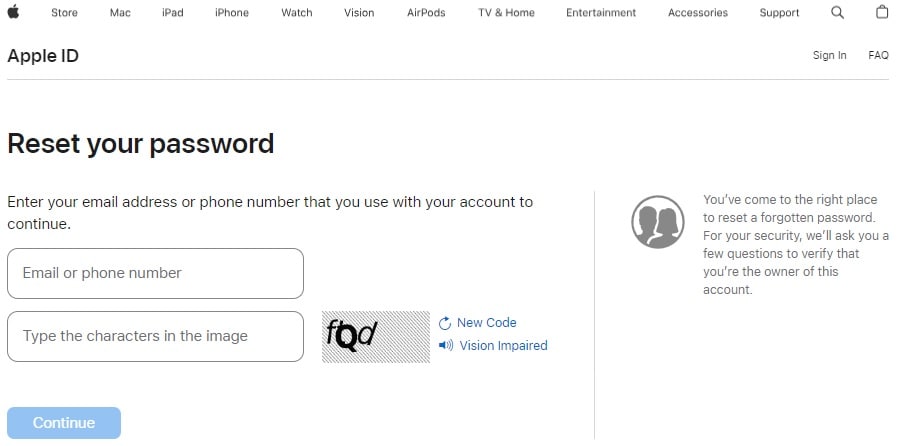
Two-Factor Authentication
If you have two-factor authentication enabled for your Apple ID, you can use your trusted device or the recovery key to unlock your account. Here’s how.
- Step 1: On your Apple iPhone 13, go to Settings. Next**,** tap on your name at the top. Tap Password & Security > Account Recovery > Recovery Key.
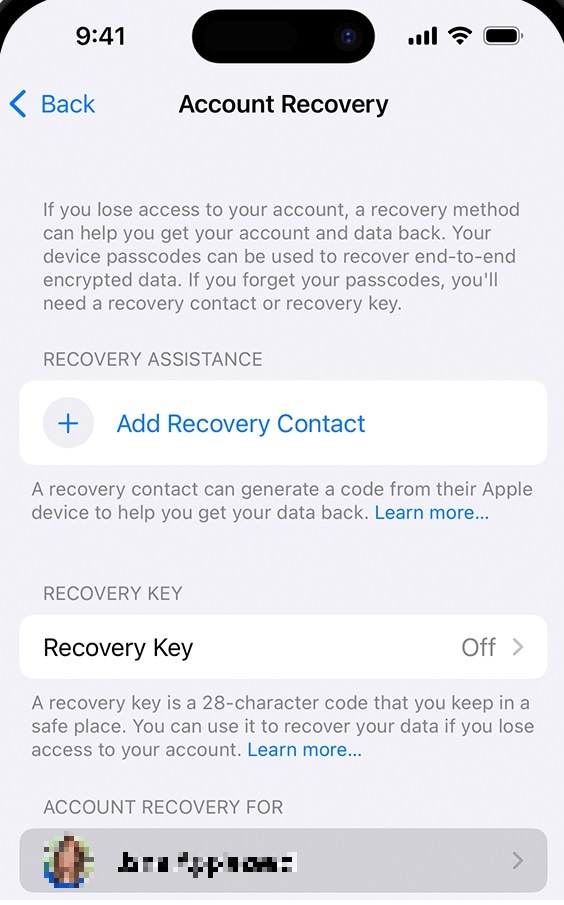
- Step 2: Turn on Recovery Key and enter your passcode. Write down your recovery key and confirm by entering it once more. You can now unlock your Apple ID with the recovery key generated.
Note
If you lose your recovery key, Apple cannot help you regain access anymore. It means that you will lose your account or data as the recovery key acts as the final security line to recover your account.
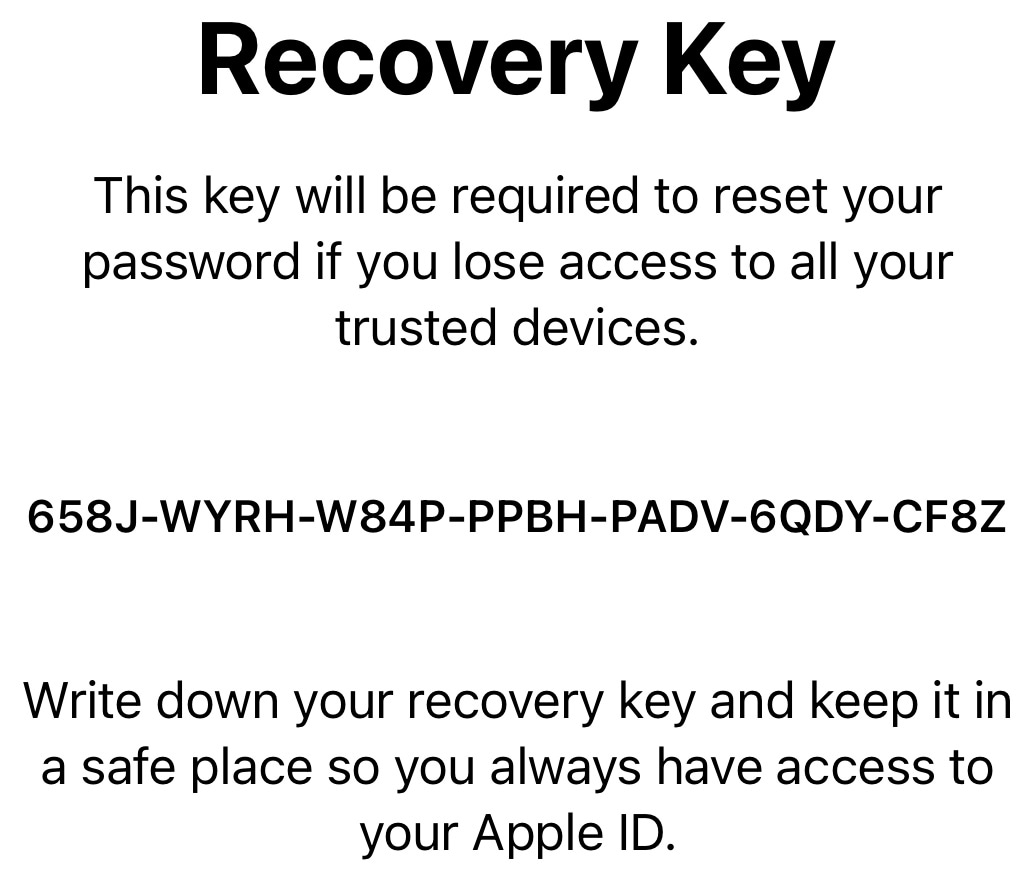
Reset Password
A simple solution to unlock your Apple ID is to reset your password. Here are the steps.
- Step 1: Go to Settings > Password & Security > Change Password on your device.
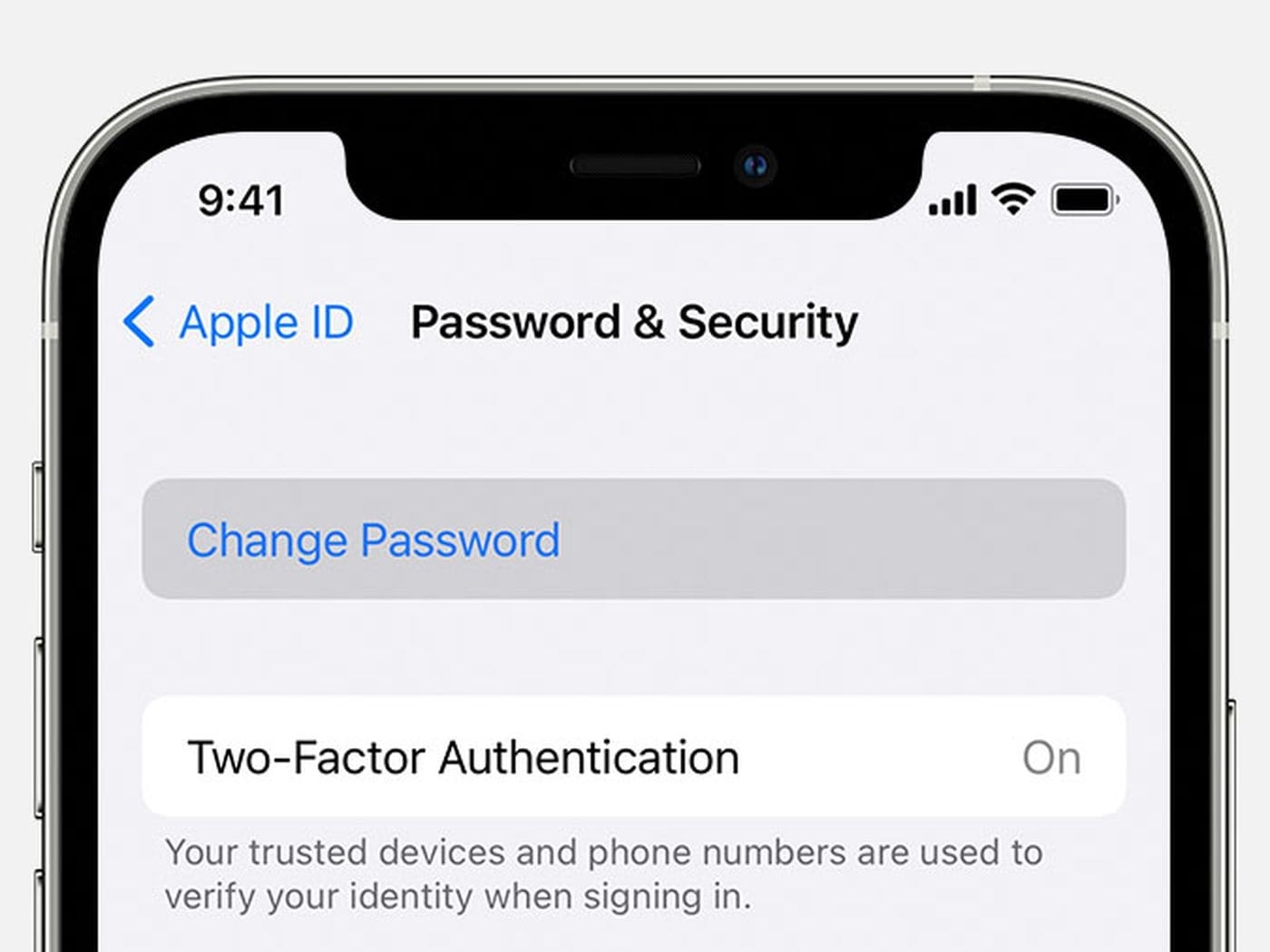
- Step 2: Enter your device passcode and follow the prompts to create a new password. Make sure it’s unique and secure to prevent future lockouts.
Email Verification
If you’ve forgotten your Apple ID password, you can initiate a password reset via email. Here’s how to do it on iPhone/iPad or Mac.
- On iPhone or iPad: On the Apple ID login screen, choose **Forgot password or don’t have an Apple ID?**Next, select Email authentication. You’ll receive an email with instructions to reset your password.
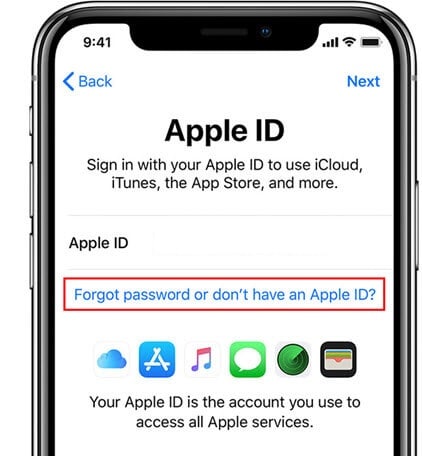
- On Mac: Choose the Applemenu and click System Settings. Click Sign in with your Apple ID > Forgot Apple ID or password? and follow the onscreen instructions.
While these methods should help you unlock your Apple ID, remember to keep your account secure to avoid future issues. If your issue persists after troubleshooting, then you may need an alternative solution. Dr.Fone - Screen Unlock, a trusted third-party solution, can resolve most Apple ID problems.
Part III. Unlock Your Apple ID With a Faster and More Flexible Solution
Unlocking your Apple ID is crucial to maintain your data. When traditional methods fail, Wondershare Dr.Fone - Screen Unlock offers a faster and more flexible solution. This reliable tool fixes most Apple ID issues with several benefits to boot.

Key Features
- Unlock Apple ID without a password. Fone Screen Unlock can unlock your Apple ID without requiring your password. The tool can be a lifesaver when all else seems to have failed.
- **Remove all types of screen locks.**Whether it’s a forgotten passcode, Touch, or Face ID, Dr.Fone can also remove all types of lock screens.
- **Compatible with the latest iOS.**Fone Screen Unlock is updated to stay compatible with the latest iOS and Apple devices. It ensures you can rely on it, regardless of your device’s model or software version.
In situations where traditional methods don’t work, Dr.Fone provides a solution to regain access to your Apple ID.
How To Unlock Disabled Apple ID Using Dr.Fone in 3 Steps
Unlocking a disabled Apple ID using Dr.Fone - Screen Unlock is straightforward. You can accomplish it by following three simple steps. Here’s how.
Step 1: Download Dr.Fone - Screen Unlock on your computer. Install the application and launch the software. Afterwards, select Screen Unlock from the main interface.
Step 2: In the next window, click Remove AppleID. Connect your Apple iPhone 13 to the computer using a USB cord and tap Trust on your Apple iPhone 13.
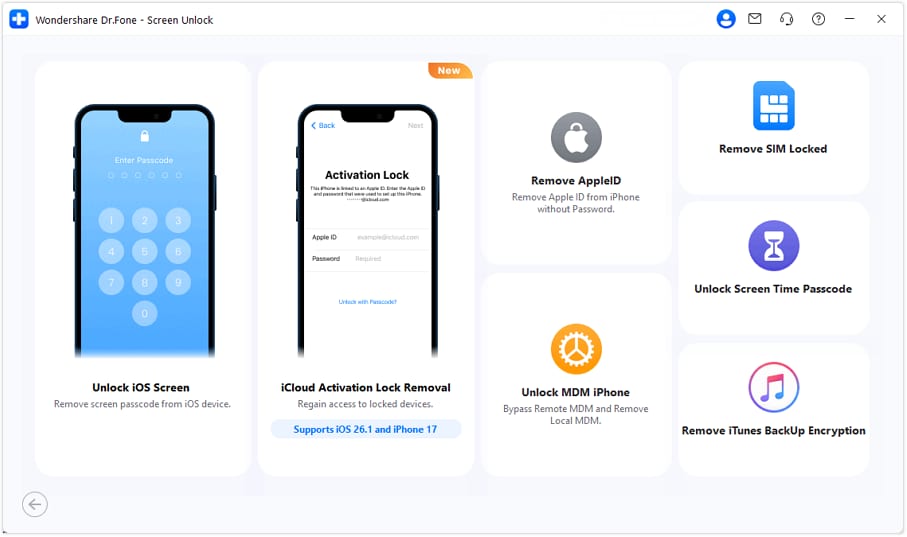
- Step 3: Follow the onscreen instructions, and let Dr.Fone - Screen Unlock process. It will unlock your disabled Apple ID without needing a password in minutes. When the process is complete, a notification on your screen will indicate that the Apple iPhone 13 device has been unlocked.
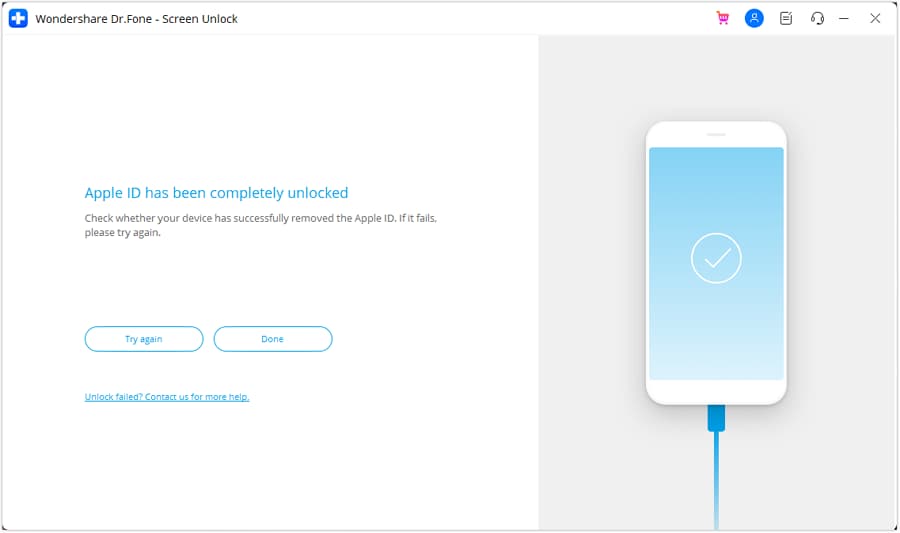
Bonus: Tips To Prevent Future Apple ID Lockouts
Preventing future Apple IDs from getting locked is essential to maintain access to Apple’s ecosystem. Here are some key tips to help you secure your account and avoid potential issues:

Use Strong Security Practices
Enable two-factor authentication for an extra layer of security. Use a complex and unique password. Use a mix of upper and lower-case letters, numbers, and symbols. Avoid using guessable information, like birthdays or common words.
Update Your Apple ID Information
Keep your contact information, recovery email, and security questions up to date. This ensures you can regain access if you forget your password or face account-related issues.
Check Your Account for Unusual Activities
Review your recent account activity. Look for unfamiliar devices or locations accessing your Apple ID. If you spot any suspicious actions, change your password and take necessary security measures.
Stay Informed About Apple’s Policies
Familiarize yourself with Apple’s terms of service and policies to avoid violating them. It will help prevent account disablement due to policy breaches.
Keep Your Payment Information Current
Ensure that your payment methods are up to date. Avoid any payment-related issues that might lead to your Apple ID being disabled.
Beware of Phishing Attempts
Be cautious of unsolicited emails, messages, or websites that request your Apple ID credentials. Always verify the authenticity of communication from Apple.
Secure Your Devices
Use a passcode, Touch ID, or Face ID to protect your Apple devices. It adds an extra layer of security to your account.
Conclusion
Safeguarding your Apple ID is important in maintaining access to Apple’s services. Knowing the common reasons for having an Apple ID locked situation is essential. By implementing strong security practices, you can prevent future lockouts. You should also monitor your account for unusual activities as an added measure.
However, consider using reliable third-party tools like Dr.Fone if all else fails. The platform works as a last resort or as a trusted companion to easily unlock your Apple ID. Prioritize your Apple ID’s security to enjoy the full benefits of the Apple ecosystem.
How To Delete iCloud Account: Remove Your Apple ID Permanently On Apple iPhone 13
Searching “How to delete iCloud account?” If you want to delete an iCloud account, you must delete an Apple ID account. And before you take this irreversible step, it’s crucial to understand the implications. Deleting your Apple ID account means permanently erasing all contents stored in your iCloud, such as media and documents. You’ll also lose access to essential Apple services such as the App Store, iMessage, and iTunes.
Deleting your Apple ID is a significant decision that should not be taken lightly. Proceeding with Apple ID deletion is a final decision. Once initiated, there’s no turning back. If you’re certain about it, refer to this article for a step-by-step guide on how to delete iCloud account and explore alternative options if you need it.

Part 1: Deleting iCloud Account? Essential Preparations Before You Proceed
Before you learn the steps on “how to delete icloud account,” take steps to ensure a smooth transition and prevent the loss of valuable data. Before you permanently remove an iCloud account, ensure you’ve completed the following:
Backup Your Data
Create a local copy of your files, photos, videos, and documents on your computer or an external hard drive. You can use cloud storage services or third-party apps like Wondershare Dr.Fone to selectively restore it later.
Request a Copy of Your Data
Apple provides a service on selected regions that allows you to request a copy of data associated with your Apple ID before deleting your account. It includes records of your sign-in, account details, iCloud contents, and Apple retail store transactions. Having a copy of this data can be useful if you need to access it in the future.
To request a copy of your data, go to Privacy Apple on your web browser. Under the Obtain a copy of your data section, click Request a copy of your data. Next, select the data you need and click Continue.
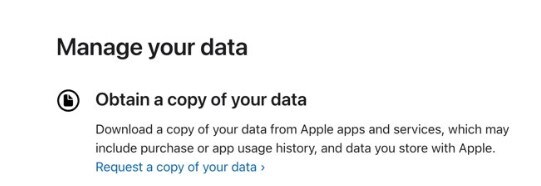
Review Your Active Subscriptions
Also, to “delete iCloud account,” first review any active subscriptions you may have, such as Apple Music, Apple TV+, or iCloud+ storage. If you don’t want to continue these subscriptions, cancel them before deleting your account.
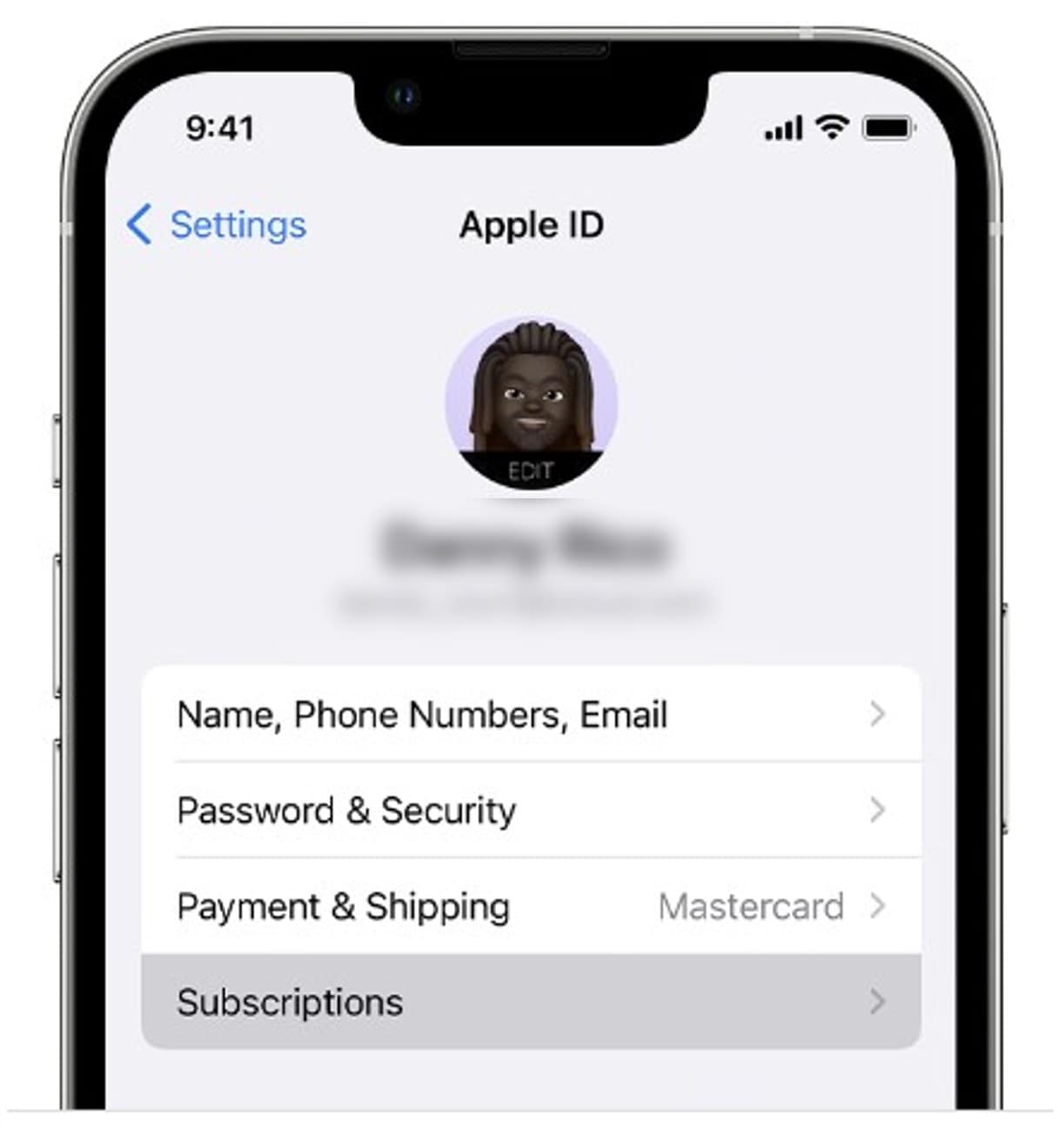
Download Backups of Your Apps, Games, Music, Movies, TV Shows, Books, and Audiobooks
Your iCloud account may contain backups of your apps, games, and media purchases. Before deleting your Apple ID account, download them to your device or a computer to ensure you don’t lose access to your favorite content.
Pay Loan Installments You Have With Apple Pay Later
If you have an outstanding loan with Apple Pay Later, pay off any remaining installments before you delete your iCloud account. Otherwise, you may incur late fees or other penalties.
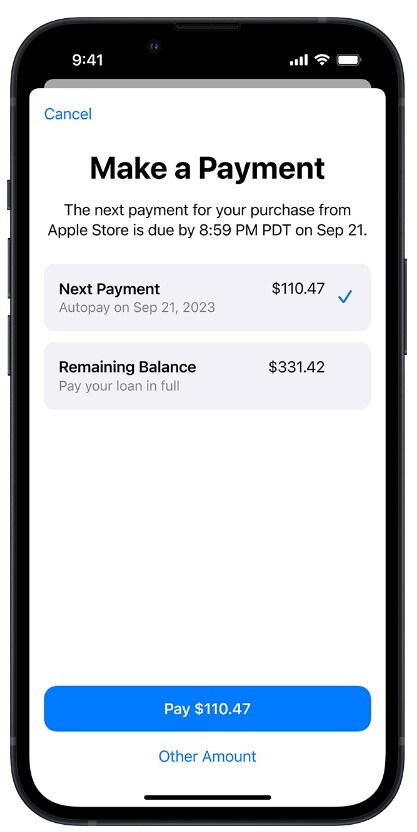
Sign Out of Your Devices and Web Browser
Before deleting your iCloud account, ensure you sign out of your account on all devices, including iPhones, iPads, Macs, and web browsers. Failure to sign out of an account can lead to several potential risks and inconveniences, including:
- Restricted device access
- App malfunctioning
- Constant Sign-in errors
- Web browsers retain your Apple ID information
Part 2: Remove iCloud Account Without Deleting: Maintaining Your Apple ID
Removing an iCloud account from your device doesn’t necessarily mean deleting the account itself. It simply means signing out of your iCloud account on that device. Your iCloud data remains intact and accessible from other devices.
However, when you sign out of iCloud on your device, you will be signed out of all Apple services that use your iCloud account. It includes Apple Pay, Find My, iCloud Mail, Siri Shortcuts, and others. You need to sign in with your Apple ID to use these services again.
Remove iCloud Account on iPhone
Here’s “how to remove iCloud account“ from your Apple iPhone 13 without deleting the account:
- Step 1: Open the Settings app, then tap the Apple ID at the top of the Apple iPhone 13 screen.
- Step 2: Scroll down, tap on Sign Out, enter your Apple ID password, and tap on Turn Off.
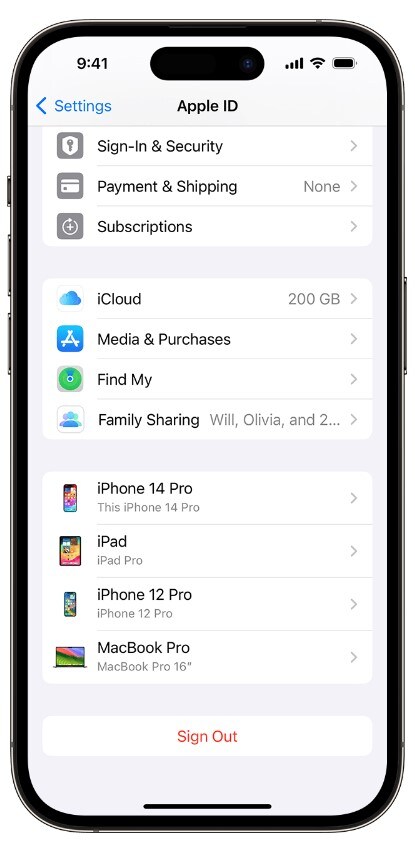
- Step 3: Tap on Sign Out to verify.
Remove iCloud Account on Mac Device
Follow these steps below to remove an iCloud account from your macOS Ventura or later:
- Step 1: Click on the Apple logo in the top left corner of your screen, then choose System Settings.
- Step 2: Click on the Apple ID icon and click Sign Out.
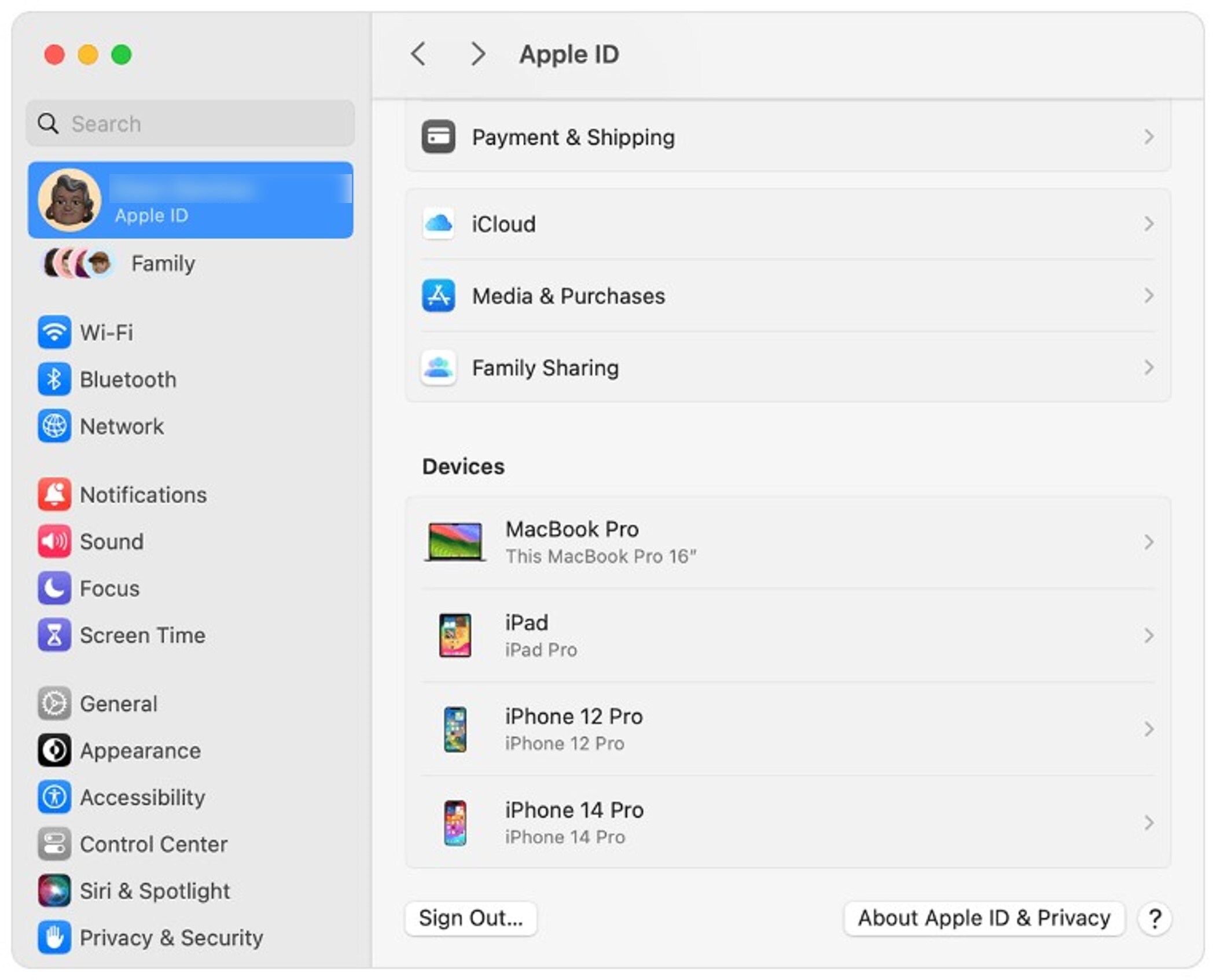
- Step 3: Select the data files you want to save, then click Keep a Copy.
Part 3: How To Delete iCloud Account Permanently?
Deleting your Apple ID has effects beyond the loss of data and services. These include:
- Apple will not be able to recover your Apple ID or any associated data once deleted.
- After deleting your iCloud account, any messages sent to you via iCloud Mail or iMessage will not be delivered.
- If you have any unused credit balance in your iCloud account, you cannot redeem or refund it upon deletion.
- The email address associated with your deleted Apple ID becomes unavailable for creating a new Apple ID.
If you are sure of your decision and have prepared for the consequences, here’s how to permanently delete your iCloud account:
- Step 1: Open a web browser and visit Apple’s privacy website: privacy.apple.com. Sign in using the Apple ID associated with the iCloud account you want to delete.
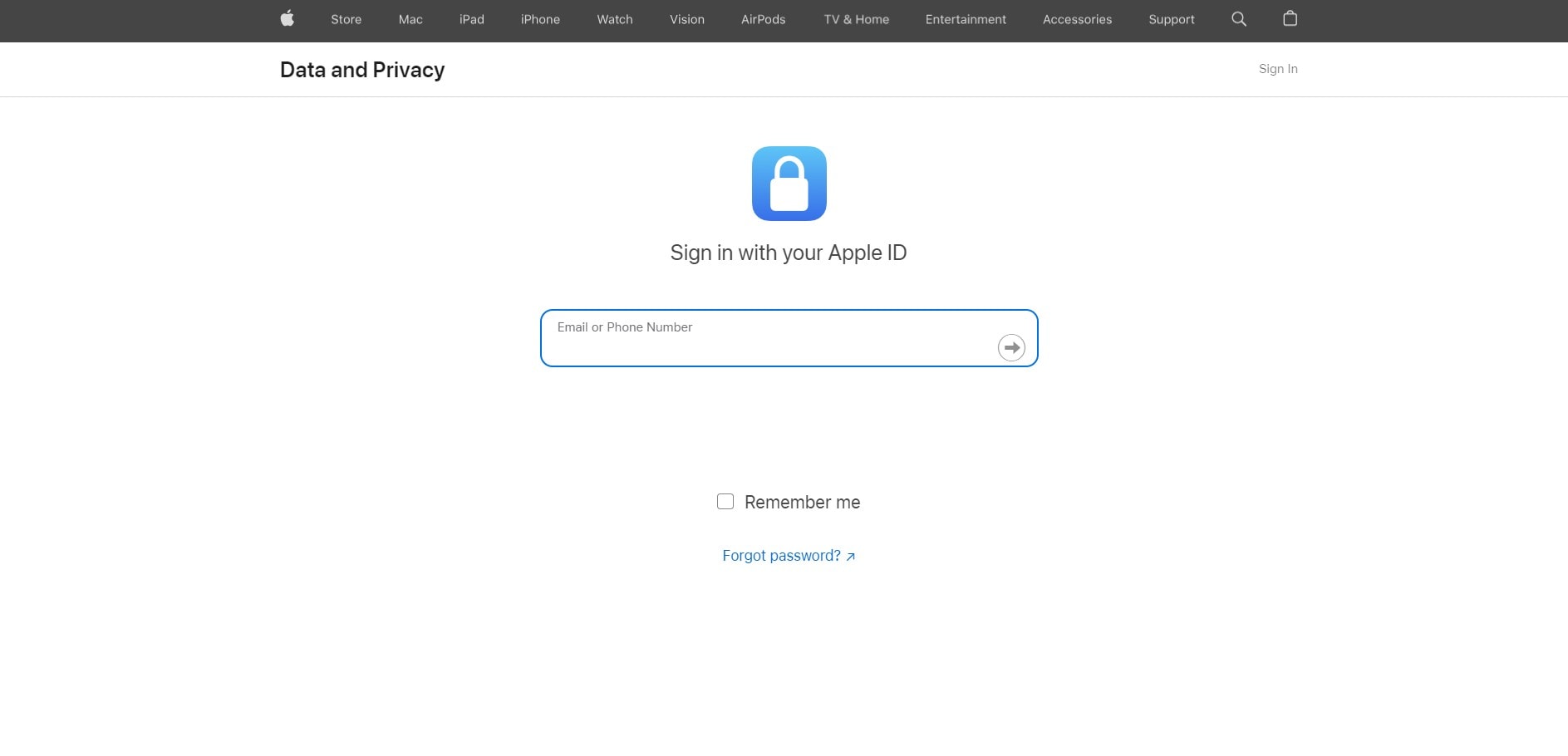
- Step 2: From Delete your account section, click Request to delete your account.
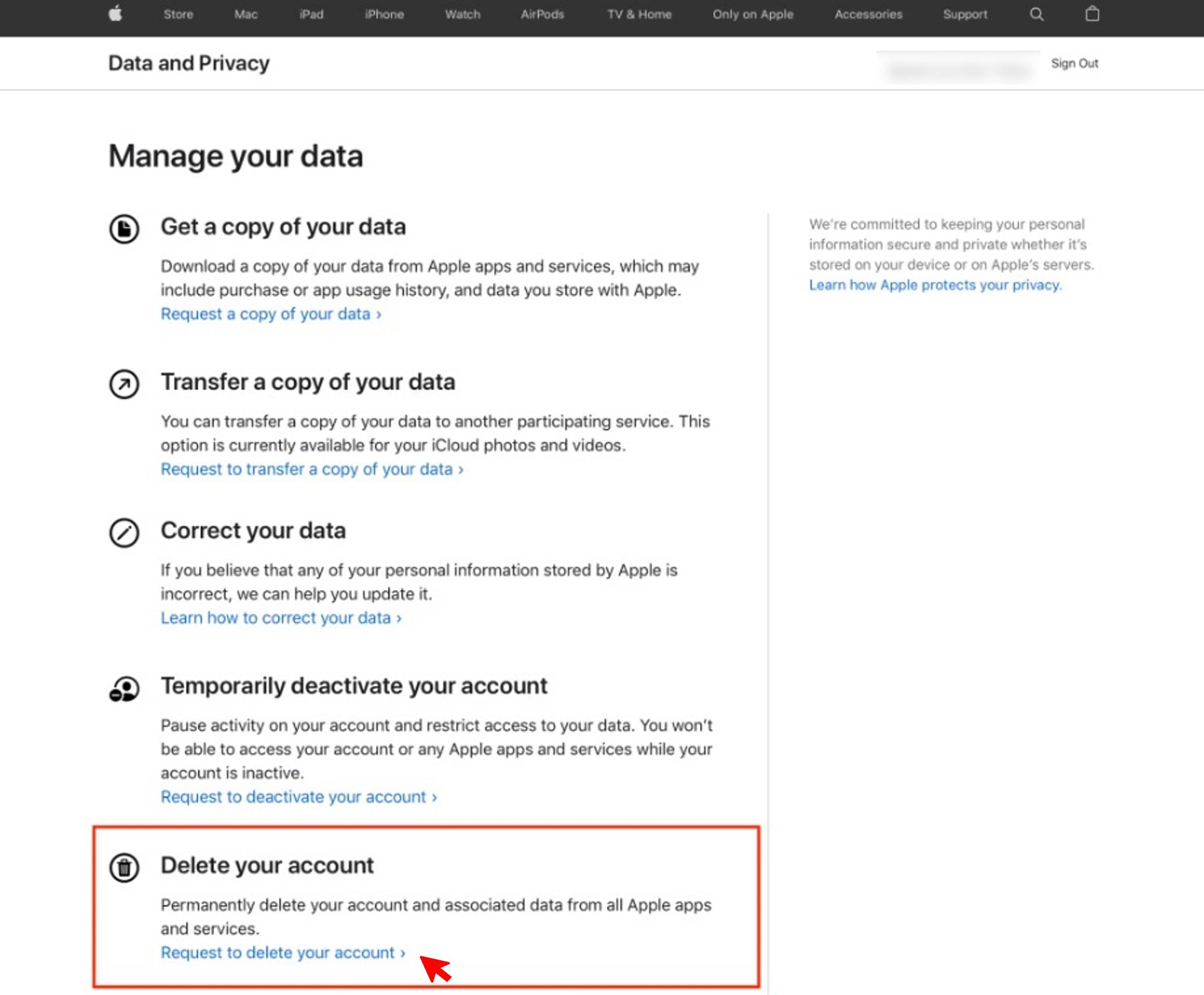
- Step 3: Choose a reason from the provided options in the drop-down menu for deleting your iCloud account, then click Continue.
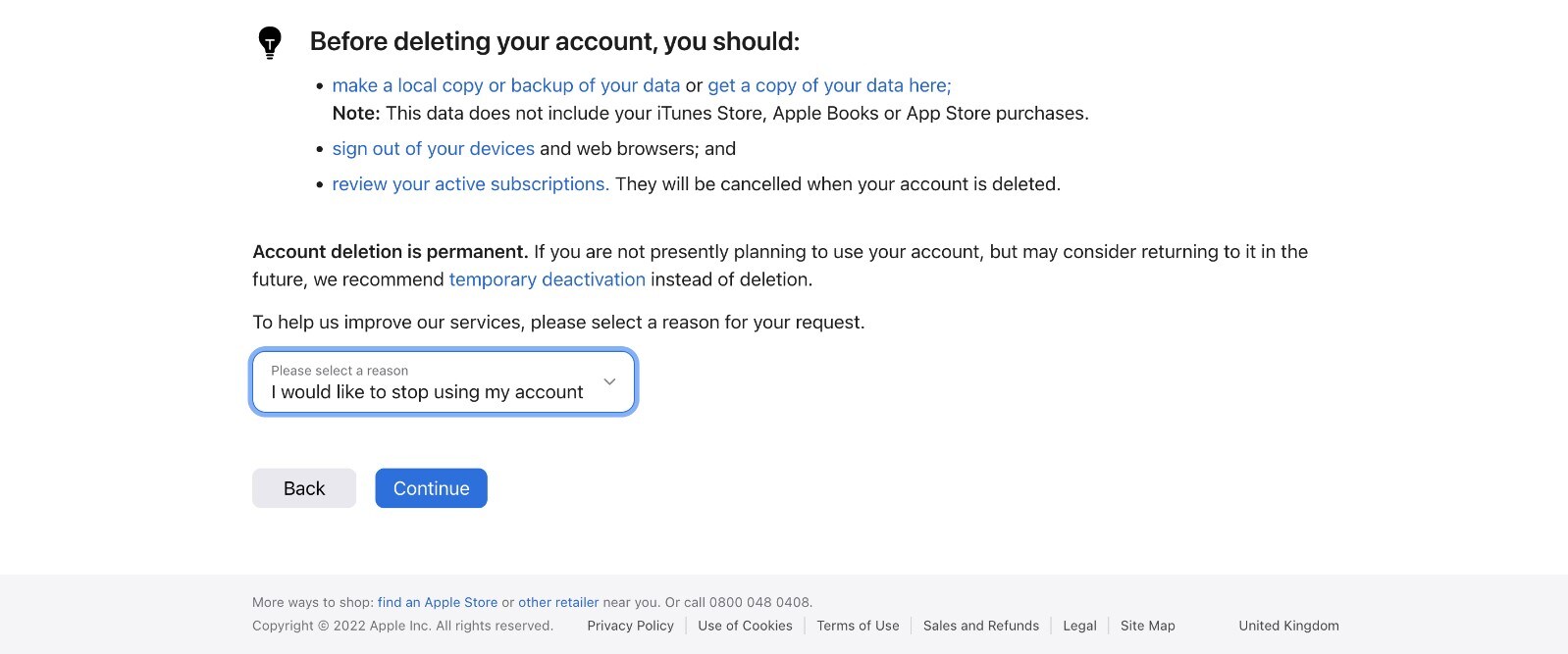
- Step 4: Review the information displayed, ensuring you want to proceed with deleting your iCloud account. Click Continue.
- Step 5: Choose where Apple can send you updates regarding your deletion request. Click Continue.
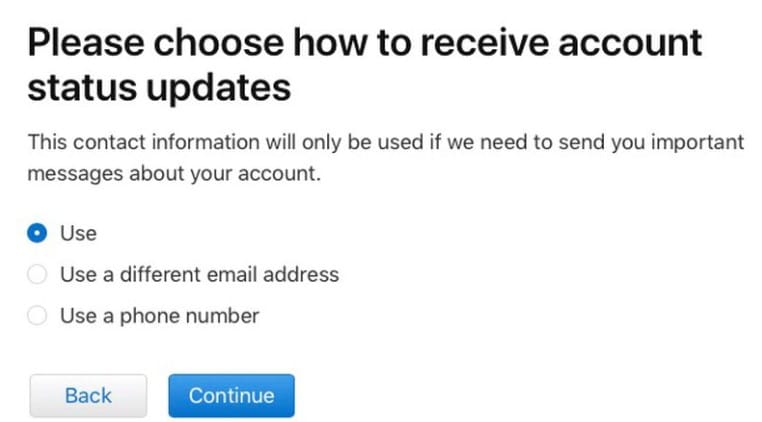
- Step 6: Follow the instructions provided to verify your identity. It may involve entering a code sent to your trusted device or answering security questions.
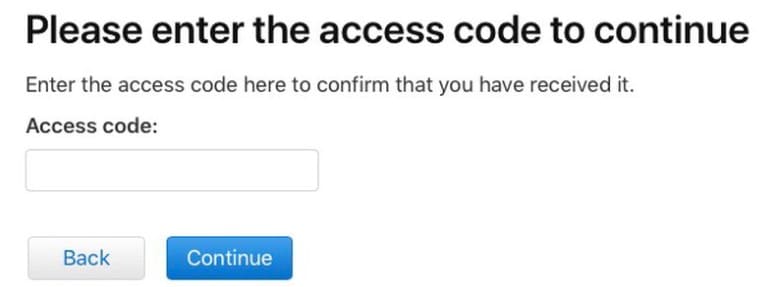
- Step 7: Review the summary of your deletion request, ensuring all details are accurate. Next, click Delete Account to finalize the deletion process.
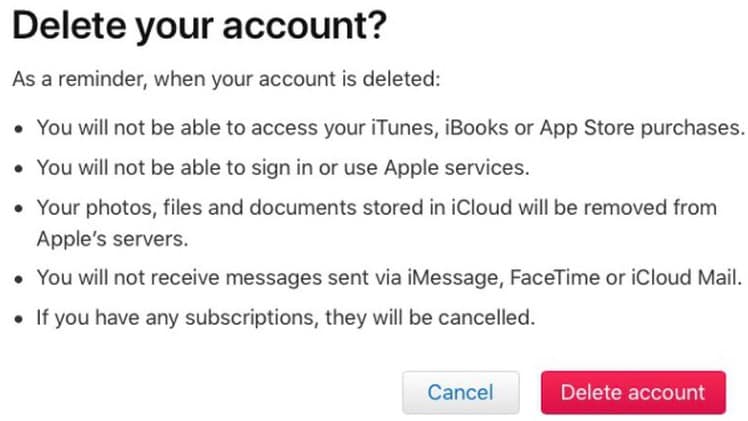
Part 4: How To Remove an iCloud Account Without a Password?
You’re not alone if you’ve forgotten your Apple ID password or bought a used iPhone with the previous owner’s Apple ID still on it. Many people find themselves in this situation, and it can be frustrating not being able to remove the iCloud account without the password. Fortunately, there is a way to do this using Dr. Fone’s iOS Screen Unlock tool:
- Compatible with all versions of iOS, including the latest iOS 17.
- Unlock different iPhone locks, such as screen locks and SIM locks.
- Bypass iCloud Activation lock
- Remove Apple ID even if the iOS device has enabled Find My service
Here’s a step-by-step guide on how to use Dr.Fone to remove an iCloud account without a password:
Step 1: Download and install Dr.Fone on your desktop.
Step 2: Launch the software and go to My Device. Follow the in-app instructions to connect your Apple iPhone 13 to your computer using a USB cable.
Image name: how-to-delete-icloud-account-13.png
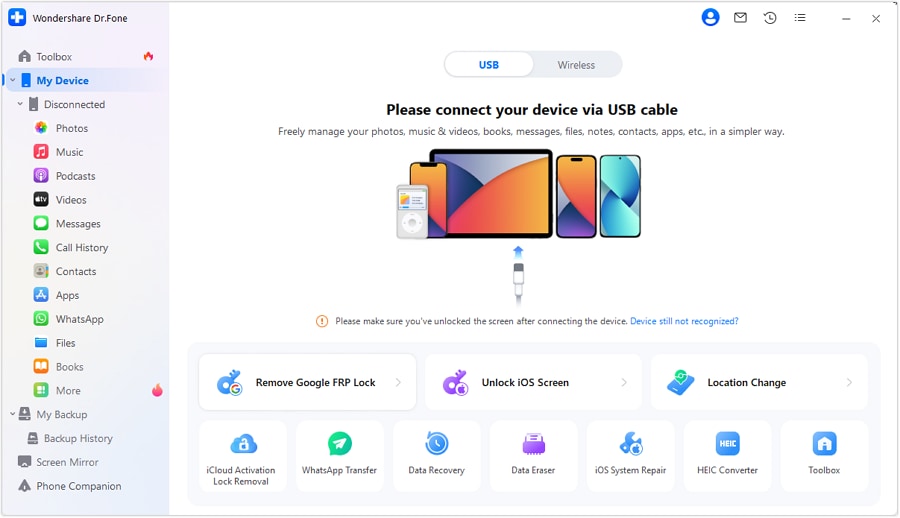
- Step 3: Go to Toolbox from the left navigation pane and select Screen Unlock > iOS.

- Step 4: Select Remove AppleID on the next window.
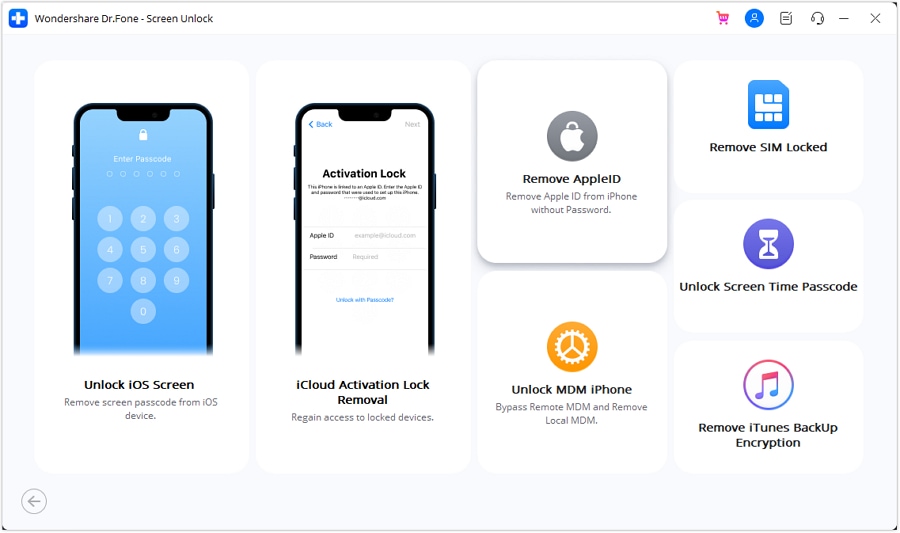
- Step 5: Click Unlock Now to proceed.
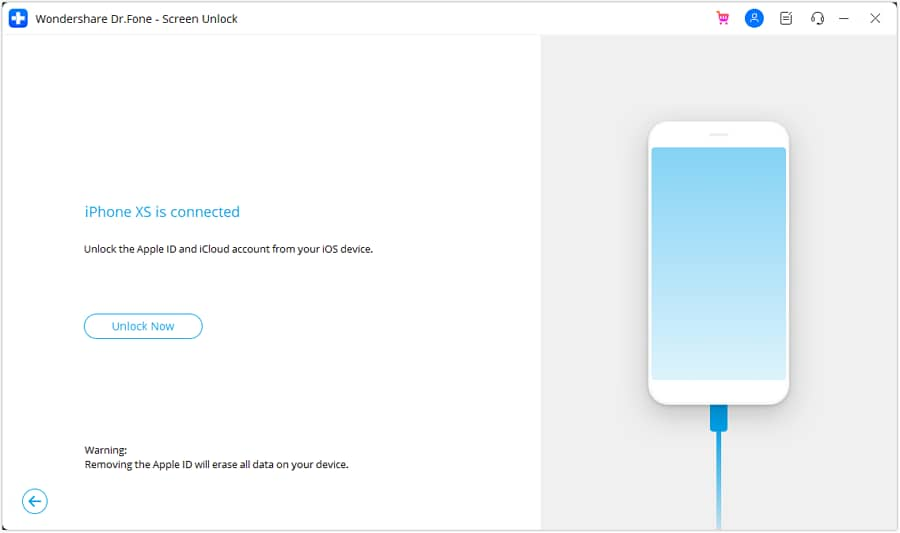
Note:
If you continue to “remove iCloud account“, this will erase all data from your Apple iPhone 13.
- Step 6: Click Yes if you have set up a screen lock.
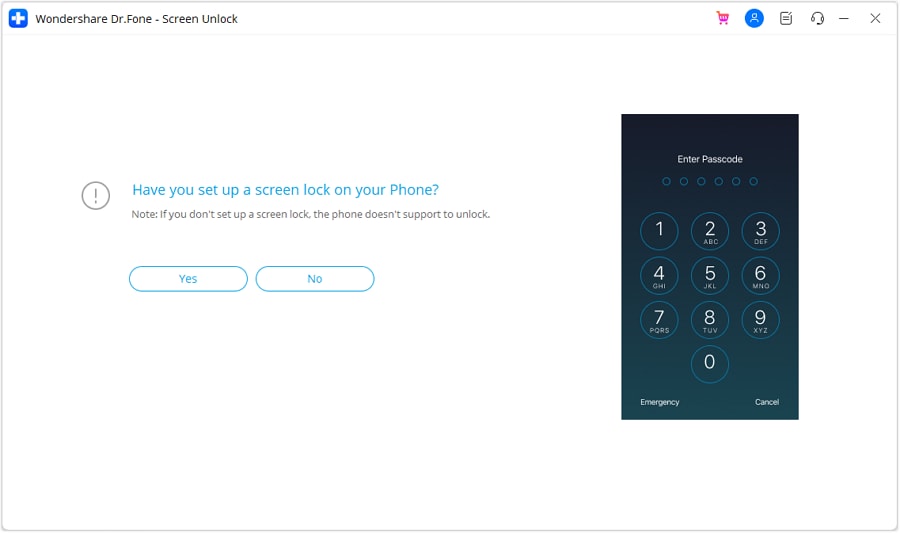
- Step 7: Click Yes if you have already enabled Two-Factor Authentication on your Apple iPhone 13.
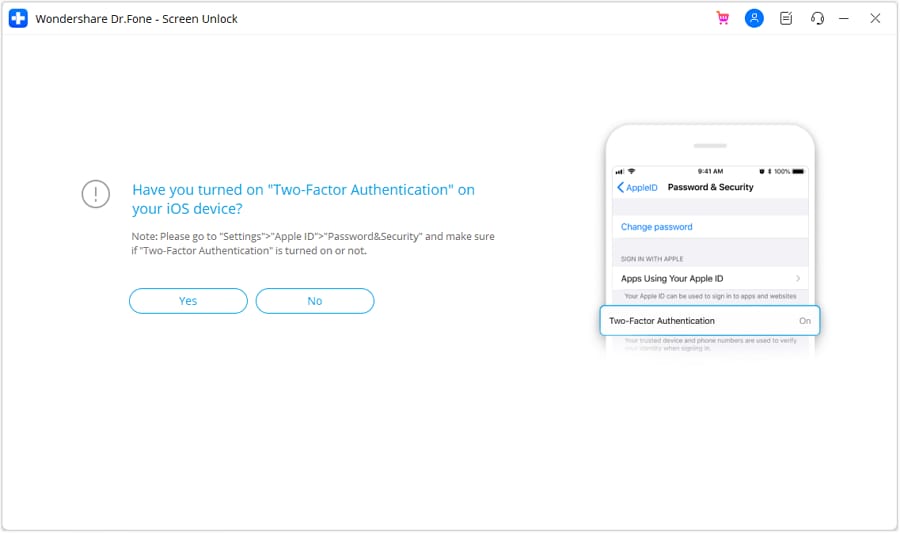
- Step 8: Follow the on-screen instructions to put your device into Recovery Mode.
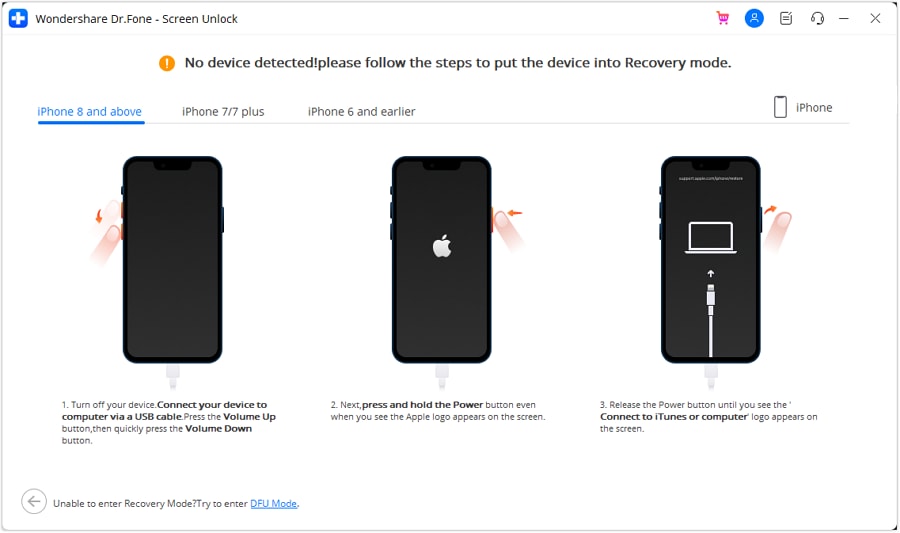
- Step 9: Dr.Fone will recognize your device in the Device Model. Choose an option from the System Version drop-down list and click Start.
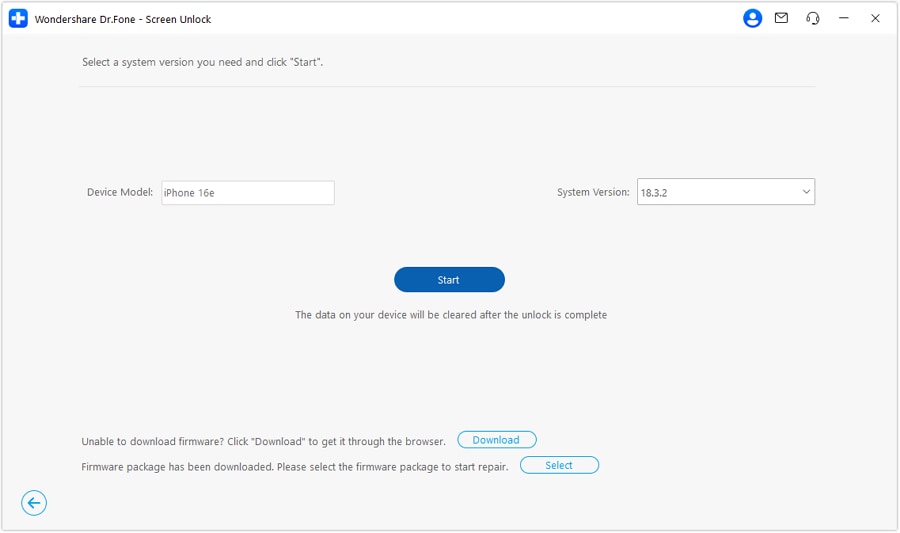
- Step 10: The latest iOS firmware is being downloaded.
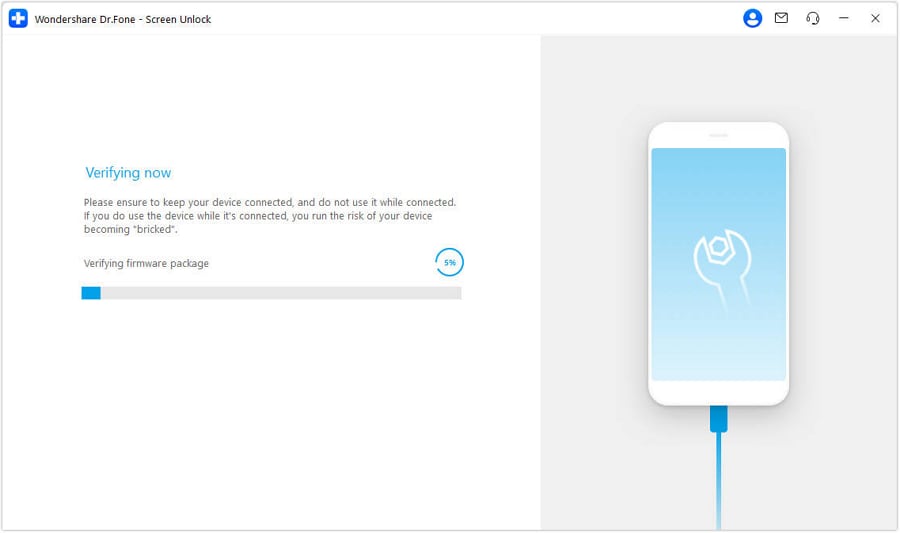
- Step 11: Click Unlock Now to proceed.
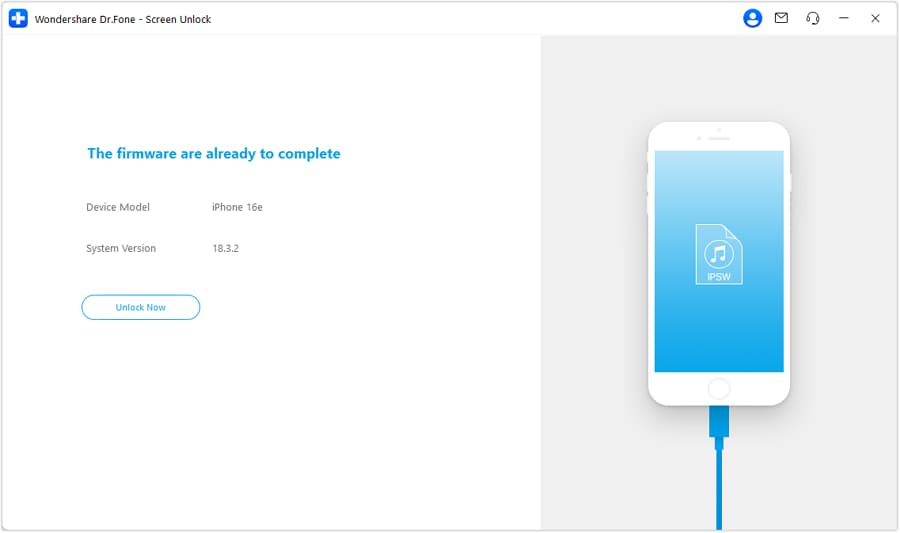
- Step 12: Enter the code given in the dialogue box and click Unlock to continue.
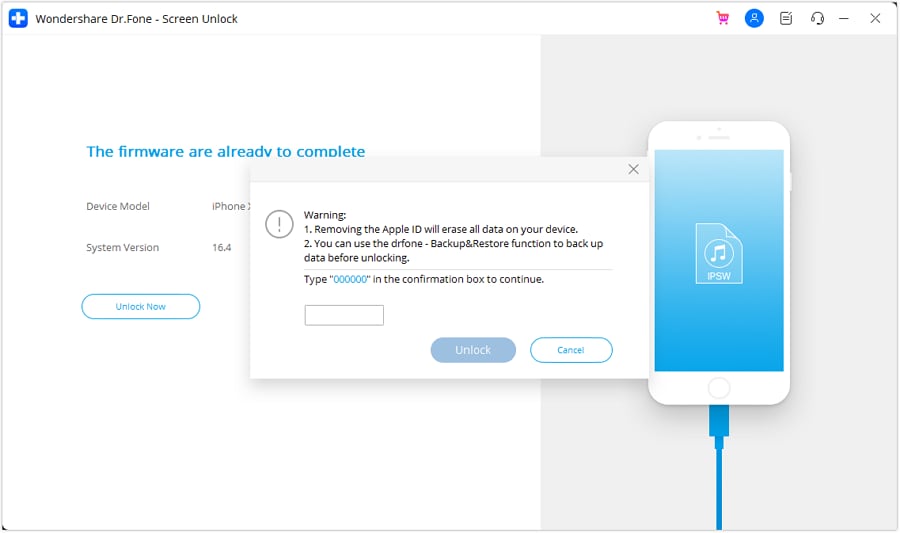
- Step 13: Dr.Fone will then begin removing the iCloud account. Do not disconnect or use your device while the process is ongoing to avoid device issues.
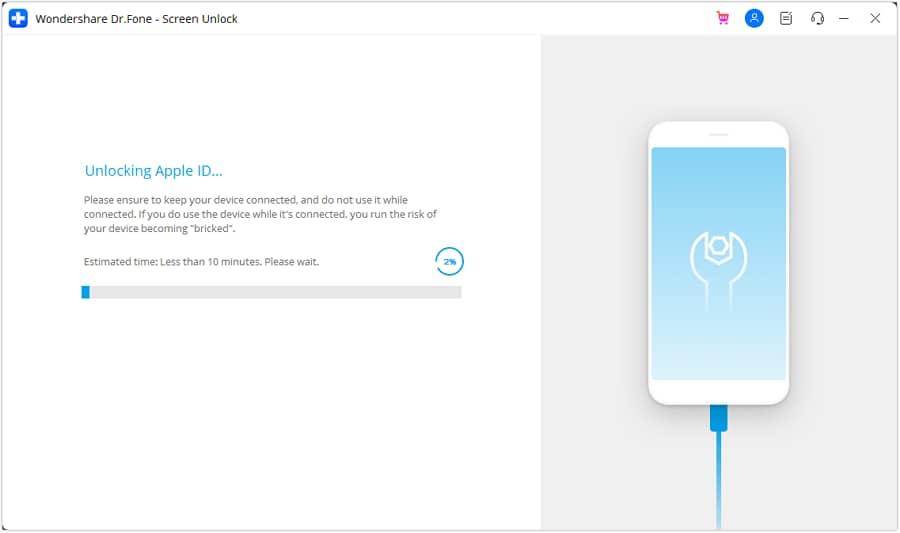
- Step 14: To finalize the Apple ID removal process, please check your device and click Done once you’ve verified it.

Part 5: How To Remove an iCloud Account Without Deleting an Apple ID Account?
Deciding to permanently “delete iCloud account“ or Apple ID is a significant step. If you’re unsure about this irreversible action, consider deactivating your account. Deactivating your Apple ID temporarily suspends it. However, this feature may depend on your location.
Once you deactivate your Apple ID, you can no longer use it to sign into any Apple services, including iCloud, the App Store, iTunes, Apple Books, FaceTime, and Apple Pay. Even so, deactivating your Apple ID does not delete your account. You can reactivate your account anytime to regain access to all your Apple services and data.
Here’s how to temporarily deactivate your Apple ID account:
- Step 1: Go to Apple’s Data and Privacy website. Sign in using your Apple ID.
- Step 2: Scroll down to the Temporarily deactivate your account section and click Request to deactivate your account.
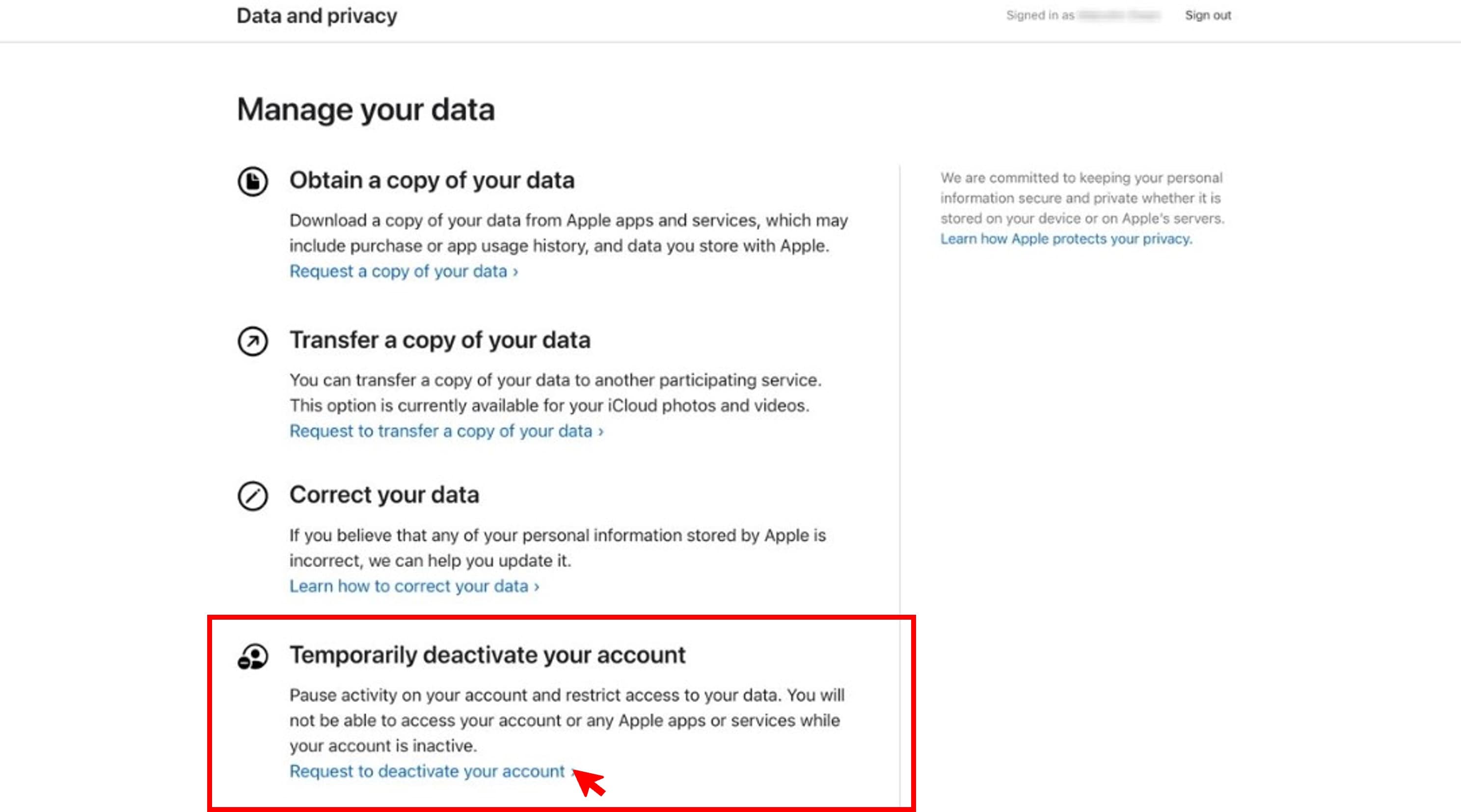
- Step 3: Select a reason for deactivating your account from the drop-down menu, then click Continue.
- Step 4: Review the information and follow the on-screen instructions to complete deactivation.
Note:
Keep the unique alphanumeric access code you’ll receive. You’ll need it to reactivate your Apple ID account.
More Article About iCloud Account:
Ways to Restore from iCloud Backup Without Reset
3 Ways to Recover iCloud Password
iOS 16: Best Ways to Bypass iCloud Activation Lock on iPhone/iPad
Conclusion
As you’ve learned, deleting an iCloud account is a permanent decision you cannot reverse. Once deleted, your account and all associated data will be permanently erased from Apple’s servers. Thus, it’s crucial to back up your data before proceeding.
Apps like Dr.Fone provide a comprehensive solution for backing up your data and removing an iCloud account without a password. Its user-friendly interface and streamlined processes make it an ideal choice for those seeking a quick and hassle-free experience. Whether you’re looking for an answer on “how to delete iCloud account“ or “remove iCloud account,” Dr.Fone is the ultimate tool to guide you through the process.
How to Remove Apple iPhone 13 Device from iCloud
Apple is known for developing its own unique operating system with its own dedicated operations and functions. They have developed an impressive, interconnected model that helps the user keep the data intact across the Apple iPhone 13 device. With unique identification protocols to keep the Apple iPhone 13 device safe from illegal access, Apple provides its user with its own cloud backup platform. iCloud offers Apple users a unique platform with the ability to synchronize and back their data up. This helps the users keep a duplicate in places where they accidentally lose their important data. However, if you have stopped using an Apple device that had an activated iCloud backup system, you may find it necessary to remove the Apple iPhone 13 device from the iCloud account. For such cases, there are a few techniques that can be adapted to cater to the issue at hand. This article introduces and provides you a detailed guide on how to remove a device from iCloud through the implementation of straightforward and notable techniques.

Part 1. What happens if I remove a device from my iCloud?
If you look over the operation of iCloud service for any Apple device, the exemption of the service will lead you into losing access from a service that offers you a backing up feature along with synchronization. Furthermore, this will also affect the Find My service, leading you to make your device theft evasive. The removal of the Find My service makes it possible for thieves to wipe off data of the Apple iPhone 13 device and have it sold across the market, with no chances of retrieval. Despite the removal of the iCloud service from your device, it will function normally; however, the security and tranquility offered by the Apple iPhone 13 device would not remain intact with its exemption. The iCloud account that has been removed will keep the data that has been previously stored in it by the Apple iPhone 13 device backup, but it would not accept any new addition.
Whenever you consider removing the iCloud backup from the Apple iPhone 13 device, it prompts over keeping the data on your device, if necessary. All the data that is not selected by the user will be removed from the iPhone.
Part 2. How to remove a device from iCloud remotely? (iPhone)
iCloud backup is usually important in keeping a synchronized model in effect across a device. However, when the Apple iPhone 13 device that is in use of an iCloud account is not in consumption, it is better to have the Apple iPhone 13 device removed from the iCloud account. For this, you can consider opting for the remote method of removing a device from the iCloud. The following guidelines explain the detailed method on how to remove a device from the iCloud through remote means.
Step 1: You need to turn off the Apple iPhone 13 device and open the iCloud.com website across the web browser.
Step 2: Access the “Find My iPhone” service on the webpage and tap on “All Devices.”
Step 3: This opens up the list of devices that are connected across the account. Select the Apple iPhone 13 device and tap “Remove from Account” to conclude. Proceed to confirmation of the process and have the Apple iPhone 13 device removed successfully from the iCloud account.

Part 3. How to remove a device from iCloud? (Mac)
While you consider a method that provides you a technique of removing a device from the iCloud through an iPhone, there are several other means of operation that can be utilized to remove a device from the iCloud. You can consider removing a device from the iCloud through a Mac, which needs to be concluded through a series of steps provided as follows.
Step 1: Tap on the Apple icon on the top-left of the Mac screen to open up the menu. Select “System Preferences” from the drop-down menu that appears on the screen.
Step 2: In the “System Preferences” window, you need to tap on the “Apple ID” present at the top-right of the screen.

Step 3: Over the new page that opens, scroll down on the left pane of the window, and tap on the Apple iPhone 13 device that you seek to remove. Click on “Remove from Account…” from the list of options and confirm the execution of the process. This successfully removes the Apple iPhone 13 device from the iCloud with the aid of a Mac.

Part 4. How to rescue when I accidentally remove a device from iCloud?
While you get to know a variety of platforms and techniques that can be adapted to remove a device from the iCloud, there are several circumstances where you accidentally remove a wrong device from the iCloud. The process of retrieving it is quite simple and efficient, where the Apple iPhone 13 device would be automatically added back into the iCloud account once it is connected with the Internet. It should be kept in mind that the Apple iPhone 13 device should contain the iCloud username and password under the iCloud Settings to automatically have it updated over a network connection.
Part 5. You may wonder how to remove an iCloud account without a password
The following methods are quite direct and have no issues with the iCloud username and password. Apart from the existing methods, there are several cases where the user usually forgets a specific iCloud credential that makes it impossible for them to execute a procedure that has been mentioned above. In such cases, the necessity of dedicated third-party unlocking tools gets into action. These third-party platforms are unique in setting up such an environment that keeps the Apple iPhone 13 device protected and aids in complete execution of the task with no discrepancy. There are hundreds of tools that are present in the market for removing an iCloud account from a device without a password. However, when it comes to selecting the appropriate platform, it usually gets difficult for the user to specify a unique choice. This leads the article to introduce a very impressive third-party tool known as Dr.Fone – Screen Unlock (iOS) that offers a flawless environment to cover all the requirements of removing an iCloud account from a device without a password. There are various pointers that should be kept in mind while selecting Dr. Fone as your first rated choice in removing an iCloud account without a password.
- You can easily unlock an iPhone or other Apple device if you have forgotten its passcode.
- It protects your Apple device from getting into the disabled state.
- Operates perfectly across all iPhone, iPad, and iPod Touch models.
- Compatible across the latest iOS.
- It does not require iTunes to function properly.
- Very easy to use and implement.
As you get to understand this simplistic platform, the following guide explains to the user how to remove the iCloud account from a device through the steps shown below.
Step 1: Download and Launch
You need to download and install the platform on your desktop to function. After downloading it, you need to connect your Apple iPhone 13 with the desktop and launch the platform. Select the “Screen Unlock” tool from the home window and proceed.

Step 2: Select Appropriate Option
Following this, you need to select the “Unlock Apple ID” option from the next screen that opens on your front.
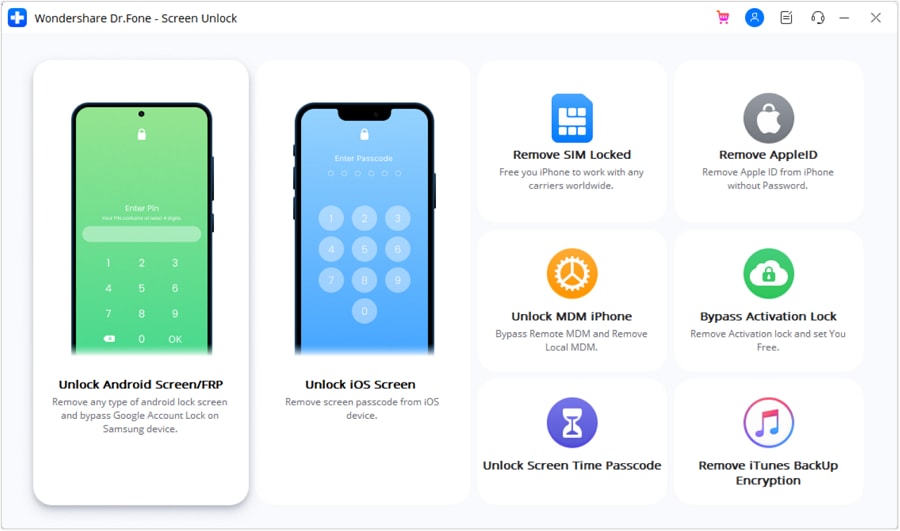
Step 3: Operating your Device
As soon as the process initiates, you need to take up your device and open it up to “Trust” the computer for proceeding. Open the Settings of your Apple device and initiate a reboot.
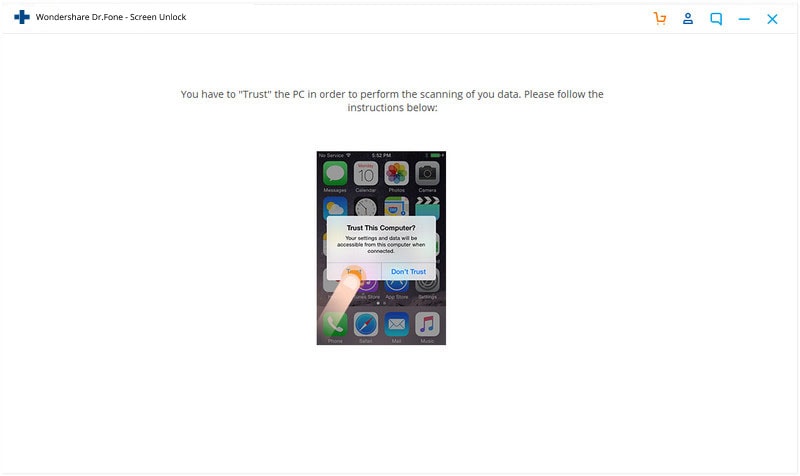
Step 4: Execution of the Process
Once the reboot executes, the platform automatically recognizes and initiates the removal of the iCloud account from the Apple iPhone 13 device. With the execution of the process, the user is provided with a detailed prompt screen displaying the completion of the process. The removal of the iCloud account from the Apple iPhone 13 device without a password has been successfully executed.

Conclusion
As you have recognized the importance of iCloud backup across your device, there are several dynamics of operation that are to be understood to keep the system prevalent and intact, in every sense. Where users wish to remove their iCloud service from the Apple device, the article has presented a series of different methods and techniques that can be implemented across various platforms to cover the requirements and successfully remove the iCloud account without any issues. Following this, the article has also looked forward to offering a third-party platform that allows the user to successfully reboot and remove the iCloud account from the Apple iPhone 13 device to make it operable. You need to look over the guide in detail to get more knowledge of the procedures and mechanisms.
Also read:
- [New] In 2024, Sharpening Your Zoom Images for Professional Conferencing
- [Updated] In 2024, Digital Destinations Where to Direct Your Videos
- [Updated] Master Your Mac The Top GIF Recorder Choices for 2024
- A Step-by-Step Guide to Finding Your Apple ID From Your Apple iPhone 15 Pro
- Alternatives to FB: Leveraging Different Messengers
- How To Create an Apple Developer Account On Apple iPhone 13 mini
- How to Remove an AirTag from Your Apple ID Account On Apple iPhone 11?
- How To Remove Phone Number From Your Apple ID on Your iPhone 13 mini?
- In 2024, Becoming a Maestro at Zoom Broadcasting on YouTube
- In 2024, Creating Smooth Time-Lapses with Samsung Mobile
- In 2024, How To Fix Apple ID Verification Code Not Working From iPhone 14 Pro Max
- In 2024, How to Remove Apple iPhone 6s Device from iCloud
- In 2024, Top-Notch Solutions for Disabled Apple ID On Apple iPhone 7 Making It Possible
- In 2024, Your Account Has Been Disabled in the App Store and iTunes From Apple iPhone 12 Pro Max?
- Leading Residential Weather Instruments - 2024'S Choices
- Mastering Windows: Easy Ways to Refresh Your Laptop's Battery Drivers
- MKV Playback Mac App Selection Guide for 2024
- Unpacking the Capabilities of Synology's RT2# AC Router - A Powerhouse in Wireless Reach & Family Management
- Why Apple Account Disabled On your iPhone 11 Pro? How to Fix
- Title: Tips and Tricks for Apple ID Locked Issue On Apple iPhone 13
- Author: Alma
- Created at : 2024-12-11 16:00:45
- Updated at : 2024-12-12 16:00:00
- Link: https://apple-account.techidaily.com/tips-and-tricks-for-apple-id-locked-issue-on-apple-iphone-13-by-drfone-ios/
- License: This work is licensed under CC BY-NC-SA 4.0.